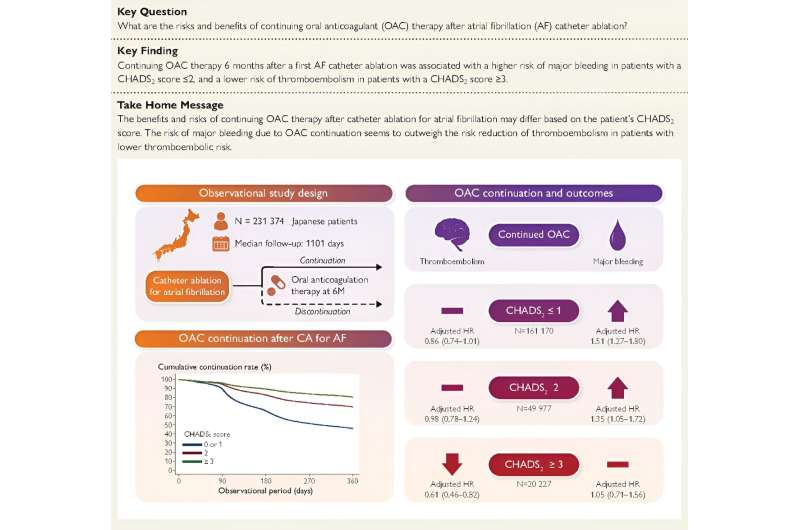This article has been reviewed according to Science X's editorial process and policies. Editors have highlighted the following attributes while ensuring the content's credibility:
fact-checked
peer-reviewed publication
proofread
Researchers reveal benefits and risks of continuing oral anti-coagulation therapy after catheter ablation

Catheter ablation for atrial fibrillation (AF) has become a common procedure worldwide. An expert consensus statement on catheter ablation for AF recommends the continuation of oral anticoagulants after the post-ablation period should be based on the patient's risk of stroke and preferences; however, few recent large studies are focusing on the risks and benefits of continuing oral anticoagulation therapy after catheter ablation for AF.
A team of researchers, led by Dr. Yoshitaka Iwanaga, has performed a nationwide cohort study using administrative data that covered almost all health care insurance in Japan and analyzed the rate of continuing oral anticoagulants after catheter ablation and the occurrence of thromboembolic and major bleeding events related to the oral anticoagulation therapy according to the thromboembolic risk.
The work is published in the European Heart Journal.
At six months and one year after the catheter ablation, 71% and 53% of the patients continued oral anticoagulation therapy, respectively, and its rate was higher in the higher CHADS2 score group than in the lower CHADS2 score group.
Continuing oral anticoagulation therapy after six months postoperatively for catheter ablation was associated with a higher risk of major in patients with a CHADS2 score of ≤ 2 and was associated with a lower risk of thromboembolism in patients with a CHADS2 score of ≥ 3.
"A substantial number of patients continued their oral anticoagulation therapy after catheter ablation for AF in Japan, but our results support the discontinuation strategy of oral anticoagulants after catheter ablation in patients with a lower thromboembolic risk," says Dr. Koshiro Kanaoka
This research could provide critical insights for health care providers when considering whether to continue oral anticoagulant therapy after catheter ablation for AF.
More information: Iwanaga Yoshitaka et al, Oral anticoagulation after atrial fibrillation catheter ablation: benefits and risks, European Heart Journal (2023). DOI: 10.1093/eurheartj/ehad798




















